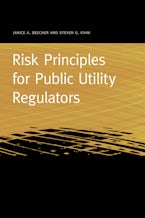Public Utility Regulation (PUR)
Series editor: Janice A. Beecher
Public utility regulation fulfills a legislative purpose and an executive function, but takes a distinctly judicial form that emphasizes evidentiary processes and the formal precedents of regulators and judges. These still have value, but as the issues of regulation have grown in complexity, so has the interest in addressing and resolving differences among parties by means other than litigation. These means require guidance as much as traditional methods. This book, authored by a team with deep experience in the subject area, offers a comprehensive overview and guide to deploying alternative dispute resolution in public utility regulation. The ideas are transferable to other policy realms where such paths to reaching decisions, possibly even better decisions, may work to the benefit of affected stakeholders as well as society in effectively achieving policy goals.
Public utility regulation fulfills a legislative purpose and an executive function, but takes a distinctly judicial form that emphasizes evidentiary processes and the formal precedents of regulators and judges. These still have value, but as the issues of regulation have grown in complexity, so has the interest in addressing and resolving differences among parties by means other than litigation. These means require guidance as much as traditional methods. This book, authored by a team with deep experience in the subject area, offers a comprehensive overview and guide to deploying alternative dispute resolution in public utility regulation. The ideas are transferable to other policy realms where such paths to reaching decisions, possibly even better decisions, may work to the benefit of affected stakeholders as well as society in effectively achieving policy goals.
Showing results 1-2 of 2
Filter Results OPEN +




